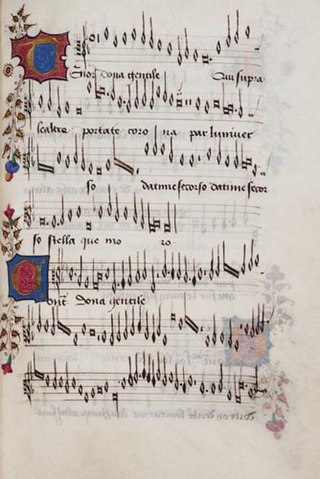
A copyright is a type of intellectual property that gives the creator of an original work, or another right holder, the exclusive and legally secured right to copy, distribute, adapt, display, and perform a creative work, usually for a limited time. The creative work may be in a literary, artistic, educational, or musical form. Copyright is intended to protect the original expression of an idea in the form of a creative work, but not the idea itself. A copyright is subject to limitations based on public interest considerations, such as the fair use doctrine in the United States.

Dmitri Dmitriyevich Shostakovich was a Soviet-era Russian composer and pianist who became internationally known after the premiere of his First Symphony in 1926 and thereafter was regarded as a major composer.
Entertainment law, also referred to as media law, is legal services provided to the entertainment industry. These services in entertainment law overlap with intellectual property law. Intellectual property has many moving parts that include trademarks, copyright, and the "right of publicity". However, the practice of entertainment law often involves questions of employment law, contract law, torts, labor law, bankruptcy law, immigration, securities law, security interests, agency, right of privacy, defamation, advertising, criminal law, tax law, International law, and insurance law.

Moral rights are rights of creators of copyrighted works generally recognized in civil law jurisdictions and, to a lesser extent, in some common law jurisdictions.

Dmitri Shostakovich's Symphony No. 7 in C major, Op. 60, nicknamed the Leningrad, was begun in Leningrad, completed in the city of Samara in December 1941, and premiered in that city on March 5, 1942. At first dedicated to Lenin, it was eventually submitted in honor of the besieged city of Leningrad, where it was first played under dire circumstances on August 9, 1942, nearly a year into the siege by German forces.
Solomon Moiseyevich Volkov is a Russian journalist and musicologist. He is best known for Testimony, which was published in 1979 following his emigration from the Soviet Union in 1976. According to him, the book was the memoir of Dmitri Shostakovich, as related to him by the composer.
Société Le Chant du Monde v. Société Fox Europe and Société Fox Americaine Twentieth Century is a French court case that had the same facts and arguments as the New York case Shostakovich v. Twentieth Century-Fox, wherein four Russian composers: Dmitri Shostakovich, Aram Khachaturian, Sergei Prokofiev and Nikolai Myaskovsky sued Twentieth Century-Fox to prevent the use of their public domain compositions in an anti-Communist film titled The Iron Curtain. The New York court predicted the future consequences of the holding of the French court, that droit moral could "prevent the use of a composition or work, in the public domain." The film was ordered seized.
Golan v. Holder, 565 U.S. 302 (2012), was a US Supreme Court case that dealt with copyright and the public domain. It held that the "limited time" language of the United States Constitution's Copyright Clause does not preclude the extension of copyright protections to works previously in the public domain.

Music publishing is the business of creating, producing and distributing printed musical scores, parts, and books in various types of music notation, while ensuring that the composer, songwriter and other creators receive credit and royalties or other payment. This article outlines the early history of the industry.
"Author's rights" is a term frequently used in connection with laws about intellectual property.

In copyright law, related rights are the rights of a creative work not connected with the work's actual author. It is used in opposition to the term "authors' rights". Neighbouring rights is a more literal translation of the original French droits voisins. Both authors' rights and related rights are copyrights in the sense of English or U.S. law.

The music of the Soviet Union varied in many genres and epochs. The majority of it was considered to be part of the Russian culture, but other national cultures from the Republics of the Soviet Union made significant contributions as well. The Soviet state supported musical institutions, but also carried out content censorship. According to Vladimir Lenin, "Every artist, everyone who considers himself an artist, has the right to create freely according to his ideal, independently of everything. However, we are communists and we must not stand with folded hands and let chaos develop as it pleases. We must systemically guide this process and form its result."
The Copyright law of the Soviet Union went through several major revisions during its existence. The first Socialist copyright law was passed in 1925. Three years later, it was superseded by a second version that remained in force for more than three decades, until it was replaced in 1961.
Copyright in Russia developed originally along the same lines as in Western European countries. A first copyright statute dated back to 1828, and in 1857, a general copyright term of fifty years was instituted. The copyright law of 1911 was inspired by Western laws of the continental European tradition. One noteworthy exception in Russian copyright law was the "freedom of translation"—any work could be freely translated into another language.
The current Copyright law of the Russian Federation is codified in part IV of the Civil Code of the Russian Federation. It entered in force on January 1, 2008.
The international copyright relations of Russia were virtually non-existent for much of the Imperial era continuing into the history of the Soviet Union until the Cold War. The Russian Empire had only a few bilateral copyright treaties with other nations were concluded; these treaties moreover were weak and of short duration. The treaties from Imperial times had all expired by the time of the Russian Revolution.

The public domain (PD) consists of all the creative work to which no exclusive intellectual property rights apply. Those rights may have expired, been forfeited, expressly waived, or may be inapplicable. Because no one holds the exclusive rights, anyone can legally use or reference those works without permission.

The Copyright Act of 1976 is a United States copyright law and remains the primary basis of copyright law in the United States, as amended by several later enacted copyright provisions. The Act spells out the basic rights of copyright holders, codified the doctrine of "fair use", and for most new copyrights adopted a unitary term based on the date of the author's death rather than the prior scheme of fixed initial and renewal terms. It became Public Law number 94-553 on October 19, 1976 and went into effect on January 1, 1978.

The Iron Curtain is a 1948 American thriller film starring Dana Andrews and Gene Tierney, directed by William A. Wellman. It was the first film on the Cold War. The film was based on the memoirs of Igor Gouzenko. Principal photography was done on location in Ottawa, Ontario, Canada by Charles G. Clarke. The film was later re-released as Behind the Iron Curtain.










